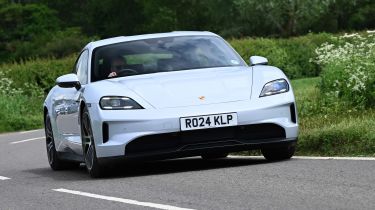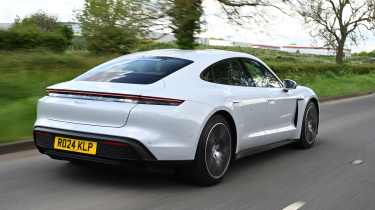Porsche Taycan review - Electric motor, drive & performance
Far from just a straight-line hero, the Porsche Taycan handles incredibly well too
Rather than a conversion of a car that originally had a combustion engine, the Taycan has been built from the ground up to be a high-performance electric model, and it shows. You sit low to the ground, it has a wide stance and the Taycan feels instantly agile thanks to its low centre of gravity, seemingly shrugging off its 2.2-tonne weight. Stepping into the Taycan, we liked our 4S test model’s optional Active Ride system that raises the car up by 55mm on air suspension to make getting into the low-slung model easier.
The latest Taycan feels even better to drive than before, and regardless of the power output you choose, it’s the car’s pure dynamic ability that makes it so good. The suspension and steering systems have been tweaked to make the car feel even more precise, and if you’ve ever driven one of the brand’s cars before – electric or otherwise – somehow the Taycan feels very undeniably Porsche.
The Porsche Taycan can be fitted with rear-axle steering, and when equipped, it’s extremely agile. The Active Ride air suspension system really comes into its own at higher speeds, and because the system allows for each corner to be individually controlled, the car is incredibly capable through the bends with very little body roll.
More reviews
The other benefit to the Active Ride system is that the Taycan is very smooth over larger bumps and road imperfections, helping to keep the ride more comfortable than in models lacking the system. The downside is that it doesn’t manage to smooth out smaller imperfections quite as well, and as a result, harsher surfaces can transmit through to the cabin whether you specify it or not.
Porsche Taycan electric motors
All but the entry-level Porsche Taycan models use two electric motors (one on each axle) to give all-wheel drive. The Taycan also has a clever two-speed transmission where most EVs only have a single forward speed. This means there's a shorter first gear designed to provide fierce acceleration and a longer cruising gear to improve efficiency at higher speeds.
Put your foot down at any speed and acceleration is gut-wrenching. The Turbo and Turbo S develop 697bhp and 764bhp during normal driving respectively, but with launch control engaged power increases to 872bhp in the Turbo and 934bhp in the Turbo S. This results in 0-62mph times of 2.7 and 2.4 seconds respectively, and a top speed for both of 162mph.
Still, the entry-level Taycan’s power figure itself is nothing to sniff at – with 402bhp it’s still pretty powerful, and a 0-62mph time of 4.8 seconds will still feel thrilling enough for most drivers. It will go on to a top speed of 143mph.
Our test model was a 4S, which gets four-wheel drive from two motors combined to produce up to 536bhp with the smaller battery, and 590bhp with the larger one, so it does the same 0-62mph sprint in 3.7 seconds (with launch control) and onto a top speed of 155mph. In some ways, many might prefer this model, as the power is a little more manageable and suited to the car. It means that, rather than the acceleration alone dominating the Taycan’s driving experience, its dynamic ability and punchy performance work in tandem with each other for a well-rounded feel. The four-wheel drive traction is very evident on the 4S, so the Taycan feels secure and puts its power down well.
For the pinnacle of what the Taycan can offer, you can go for the Turbo GT with or without the Weissach Package. The Turbo GT produces up to a whopping 1,019bhp and completes the 0-62mph sprint in just 2.3 seconds, with a top speed of 190mph.
The Turbo GT with the Weissach Package is only really for hardcore buyers with track day aspirations – the car’s weight is reduced by removing the rear seats and fitting lighter-weight panels, and the Taycan gets a big rear wing to improve downforce and cornering ability. While power remains the same as the standard Turbo GT, the result of the weight saving means 0-62mph takes 2.2 seconds and it can achieve a top speed of 190mph.










